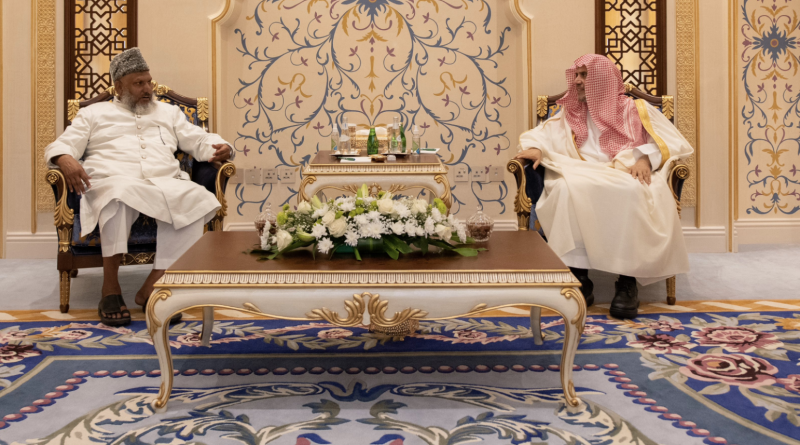India’s Jamiat Ahlehadees Chief meets Dr. Al-Issa of Muslim World League in Mecca
Jeddah — India’s Jamiat-e-Ahlehadees chief Dr. Asghar Ali Mehdi Salafi met His Excellency Sheikh Dr. Mohammed bin Abdulkarim Al-Issa, Secretary-General of the Muslim World League (MWL), at the MWL’s headquarters in Mecca on Tuesday.
The meeting was attended by Dr. Muhammad bin Abdul-Aziz Al-Mukhtar, Director General of the MWL’s Office of External Relations, and Dr. Muhammad bin Abdullah Al-Mukhtar, Director General of the MWL’s Office of International Islamic Studies.
During the meeting, His Excellency Sheikh Dr. Al-Issa and Sheikh Dr. Mahdi Salafi discussed several issues related to Islamic affairs and the concerns of Muslim peoples and minorities, especially in the Indian subcontinent.
Sheikh Dr. Mahdi Salafi stressed the MWL’s centrality in serving Muslims and representing their issues, and noted the importance of implementing the guiding principles of the Charter of Makkah.
His Excellency Sheikh Dr. Al-Issa praised the efforts of Jamiat-e-Ahlehadees in India and its role in serving Muslims in the country. He also stressed the importance of cooperation between the MWL and Jamiat-e-Ahlehadees in serving Muslims and promoting Islamic values.
At the end of the meeting, His Excellency Sheikh Dr. Al-Issa and Sheikh Dr. Mahdi Salafi exchanged gifts.
The Ahlehadees, also known as the Salafis, are a constituent group of Sunni Muslims. They adhere to the pristine teachings of Islam as enshrined in the Quran and Prophet’s sayings, and reject what has not been enjoined by the Islamic Shariah. They do not invoke Saint’s blessings, and they do not stick to any of the Sectarian Jurisprudence.
Their estimated population is about 25-30 million in India. The Markazi Jamiat AhleHadees is their representative organization, founded in December 1906. It has 21 branches at state levels, more than 200 branches at district levels, and 40,000 at local levels. It has thousands of its followers all over the country who play a great role in the development of the country. Their representation in education, industries, agriculture, politics, and defence has been recognized and appreciated by the Government of India.



